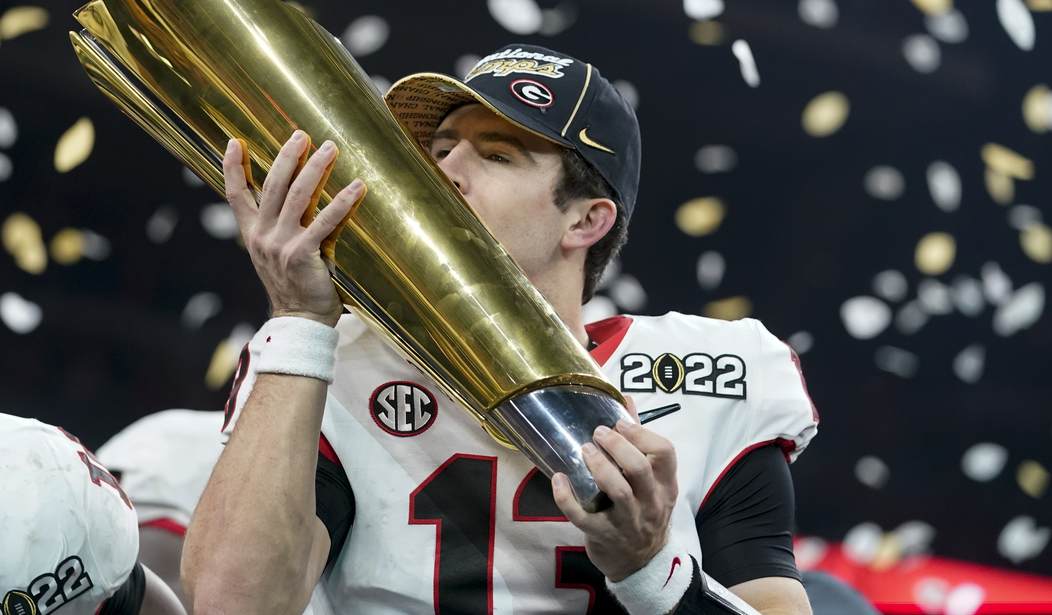A Zoom meeting that took place Monday night could send major ripples through the sports world. The College Football Playoff (CFP) Board of Managers — a group of 11 university presidents and chancellors representing the 10 conferences of the schools in the highest echelon of college football, along with the independent University of Notre Dame — held a virtual meeting earlier this week that discussed several topics.
But it’s one small snippet of the meeting that could lead to some earth-shattering consequences. The board talked about the possibility of removing college football away from the purview of the National Collegiate Athletic Association (NCAA).
“Multiple sources told ESPN that the board of managers briefly discussed the possibility of restructuring how college football is governed, with the idea presented of major college football potentially being governed outside of the NCAA,” reports Pete Thamel at ESPN.
College football and the NCAA have been intertwined since 1978, so untangling those cords won’t be easy. But who would take the reins of a sport with multiple divisions and organizations taking charge of hundreds of teams? The CFP board thinks it could handle the task.
“The most logical place for the sport to be run outside of the NCAA would be under the auspices of the CFP, which was discussed on the call,” Thamel reports. “The CFP currently oversees the sport’s postseason playoff and has contractual ties to other marquee postseason bowl games.”
Recommended: The Response to the Southeastern Conference’s New Football Season Theme Song Was Swift and Brutal
The trouble with making that kind of change is that it’s not as easy as signing some paperwork and setting a date to bring college football under new management. This meeting was essentially the first step in what could be a long road.
“Sources cautioned that these discussions are in such early stages that it could be considered the first steps of a complicated process that would resemble a marathon,” writes Thamel. “The sources added that the group spoke about the idea for only about five minutes, as it was raised as something the group should think more about down the line.”
Still, the meeting was the first official conversation that took place about the topic. After all, the CFP is the only entity that could take on the task of managing college football. Nothing has happened since the conversation on Monday, so it’s unclear what the next steps would be — or whether the conversation will continue at all.
In recent years, the NCAA has changed some of the rules governing college football, and it has created a “Wild West” atmosphere in a sport that the NCAA once governed with rigid rules. Last year’s ruling that allowed college football players to receive payment for use of their name, image, and likeness (NIL) has wreaked some havoc on the sport.
As Last Word on Sports put it back in May:
The NIL program in college athletics has been in operation for just under one year. At the beginning, players quickly began signing deals with their local car dealerships, restaurants, and even appearing in commercials. This new territory for college football provided a great opportunity for student-athletes to market themselves as a part of the multi-billion dollar industry.
More recently, however, private boosters of the universities have stepped into the arena. These boosters are rumored to be offering up to seven-figure checks to student-athletes. That’s not to say that this is the be-all, end-all incentive for players. But when a school can offer a scholarship, great coaching, and academic prowess, all while private boosters are writing checks, it is that much harder to say no.
The relaxed transfer portal rules that allow athletes to jump from program to program with more frequency have helped increase the uncertainty throughout college football.
Could the CFP reign in some of the recent craziness in the college football world? It’s possible. The playoff system, which has been in place since 2014, isn’t perfect — it has had its share of yearly controversy — but it has been a financial and ratings success. And, as big a behemoth as college football has become, having an organization managing it that only handles that sport could be a benefit. Stay tuned.










Join the conversation as a VIP Member